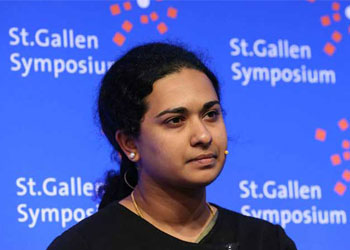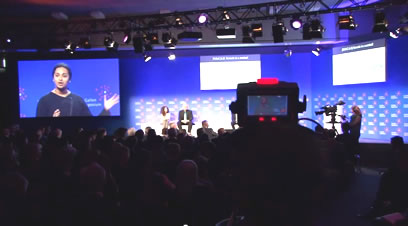Ashwini N V

Ashwini N V Ganig's idea was voted as the best at St. Gallen Symposium in the plenary session titled “What is the next small BIG thing?” on May 7, 2015, in Switzerland. Her idea was selected among entries that came from over 108 countries. In the final round, she competed with students from Harvard University, Fordham University, and Copenhagen Business School. She secured over 50% of the votes and emerged as the winner. Ashwini N V Ganig shares her views on the symposium and her winning idea [F.O.C.U.S].
You shared space with many stalwarts as well as brilliant young minds. How was the experience?
I had the opportunity to share space with over 600 top decision-makers from politics, business, media, and academia. Some of them were prime ministers, CEOs of top business corporations, journalists, academicians you have looked up to. Also, I met 200 more youngsters in my age range, engaged in various fields, from all over the world. The experience was enriching. For me, the most exciting and emotionally satisfying experience was that I could share my thoughts on mental health issues and ideas on ways to promote mental health in low- and middle-income countries, of which India is one, on the big stage amidst such esteemed folks.
Did you develop this idea exclusively for the symposium or was it something that has been in your mind for quite some time?
These ideas have been in my mind for a long time. In my small ways, I have tried my best to implement it. St. Gallen Symposium offered me a platform to share it and refine it.

Out of these five, which one would you give the most importance?
I think we have to start introducing psychological skills to children from a very young age. Through psychological skills, I mean skills like empathy, assertiveness, etc. We are a nation that takes pride in introducing life skills during adolescence in a workshop format. It is important during that stage, no doubt about it, but I think to enhance the overall wellbeing of individuals, we need to skill children from a very young age gradually like we teach everything else to our children.
How will the approach of “Flourish” clinics be any different from existing mental health institutes? Are we talking about new centers coming up or adapting the prevailing establishments into this new line of thinking?
I choose the word “Flourish” centers, not clinics to highlight the need for mental health centers to move towards promoting mental wellness as well and not just focus on preventing and treating mental illnesses. I envision that we have micro-centers of mental health in prime locations and not just keep pumping resources to some of the “grand” institutions of mental health. I wish it to be a place where there is no hierarchy between counseling psychologists, clinical psychologists, psychiatrists, psychiatric social workers, and nurses. Everyone should be involved in the dialogue on issues about mental health.
Outsourcing psychotherapeutic skills; how do you visualize its implementation? How will it be structured?
I am a firm believer that the foundations of any psychotherapeutic work must be based on facilitative conditions of empathy, genuineness, and a non-judgemental attitude. This is the foundation of a person-centered approach. I also think these are skills that everyone must know and not just mental health professionals. I aspire that we train individuals in any existing groups (e.g., group of parents, employees, microfinance self-help groups) with these skills so members can rely on one another for emotional support especially in those places where there are no mental health professionals.
You talk about culture-specific conceptualization; what would be the right approach in a country like ours where we have so many different cultures and traditions? Is there one right way to do things?
What I mean when I say culture-specific conceptualization of mental health issues and treatment is that as mental health professionals, we need to pay attention to socio-cultural factors associated with a particular region and period to understand psychological problems. We cannot look at mental illnesses and other psychological issues purely from a biomedical approach or for that matter from a perspective that is not entirely culture-specific./p>
At the symposium when you were questioned about “Unassuming philanthropy” and how it can have an adverse effect when private players take it up, you cited the example of a young child contributing her bit. Are you envisioning a platform where random contributions from the individual level are encouraged more? How do you channelize the goodwill of citizens into a pragmatic and viable model of collection and distribution of money?
Donations are made to sound too pompous. Instead, we need to encourage “micro-funding”. Anyone could be donating whatever they can, whenever they can. This will bring funding in small, sporadic forms, but is likely to build a culture of sustainable philanthropy. This is an idea that requires further planning for implementation to raise funds for the cause of mental health.
In a country like India, how do you plan to skill individuals? Don’t these individuals need the aptitude in psychology to be proficient at what they are doing?
There is a need to differentiate between the subject of Psychology and psychological skills. Psychological skills are for everyone. It is not a function of aptitude. By psychological skills, I am referring to simple things such as emotional awareness, emotional regulation, etc. It is aimed to prevent mental illnesses as many have their root cause in deficits in emotional awareness and regulation.
Future projects
My doctoral research work is on the psychology of women who burn themselves. I aim to understand their motives in choosing to burn as the method to commit suicide, their intrapersonal experiences, and test the validity of a technique that I have developed to help them recover from psychological trauma. So, this is my primary focus right now. Apart from this, I have developed several modules on the prevention of abuse of all kinds, and skills to promote mental health. I have been reaching out to thousands of people through workshops and training programs. I plan to continue and hopefully scale it up. I have been planning to conduct a series of workshops on unaddressed topics such as “Dealing with breakup blues” and “Dealing with psychological distress caused by irregular menstrual cycles among young girls”. These are topics that are not addressed from a psychological perspective. I think we mental health professionals must gear up to addressing these topics, as they matter too. Also, currently, on the top of my mind is this urge to facilitate building a strong community of people committed to the cause of promoting mental health.